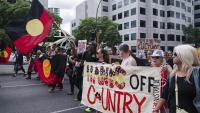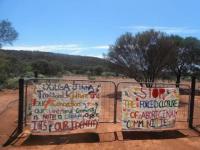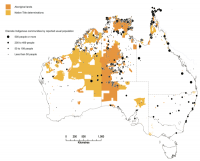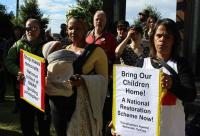Plans for Aboriginal remote communities just published by the Western Australian state government have sparked concern that their real purpose is to close most of them down – old toxin relabelled. This although Amnesty International Australia and others have found that traditional lands are proven to be beneficial to physical and mental health in adults and children alike. And the plan violates the UN Declaration on the Rights of Indigenous Peoples, which Australia has ratified, which stipulates that Aboriginal people have the right to live in their own communities without experiencing discrimination of any kind, and to receive government support to do so.
Under the $220m plan the Western Australian government intends to stop funding 129 remote Aboriginal communities and develop 10 large communities into “normalised” towns, linking better housing to school attendance and employment targets.
“In concentrating on towns and larger communities, the state government expects to support fewer communities over time, particularly as migration away from small outstations continues,” the draft report states. “However, the state government will not prevent Aboriginal people from living remotely or continuing to access country for cultural reasons.”
About 12,000 of the 95,000 Aboriginal and Torres
Strait Islander people in WA live in remote communities, which are a mixture of
former missions, homesteads and communities built on traditional grounds. Most
of them are located in the Kimberley and Pilbara regions and have fewer than 50
permanent residents.
Aboriginal Western Australians have been living on their lands for more than 50,000 years. As part of the oldest living culture in the world, their sites are about ten times as old as the Egyptian pyramids.
Despite being the most fundamental pillar of Indigenous identity, the connection that Aboriginal people feel to their country is one of the hardest concepts to explain to non-indigenous people.
“Connection to country is inherent, we are born to it, it is how we identify ourselves, it is our family, our laws, our responsibility, our inheritance and our legacy, wrote Catherine Liddle on the website of National Indigenous Television. “To not know your country causes a painful disconnection, the impact of which is well documented in studies relating to health, wellbeing and life outcomes. Modern constructs of identification do not work for us, in fact they dismantle the fabric that holds us together.”
“The WA government 'Homelands Dieback' blueprint attacks culture and rights,” comments the Sovereign Union - First Nations Asserting Sovereignty. “The WA government's lack of support and suppression through policies, legislation and attitudes toward Homeland communities in the Kimberley and Pilbara regions leaves our brothers and sisters vulnerable to their acts of genocide.
“This is the way the government refuses to address the underlying issues that are coming under fire by members of the United Nations.
“The Barnett government continues to use their well-honed paternalistic based policies on our people to open up the land for mining and international investments, and in doing so, saves them the responsibility to improve health and other issues caused directly by government’s purposeful neglect.”
“The spin is all about 'better living conditions', 'supporting families' and 'more opportunities'. However the substance is still entirely about penny pinching and withdrawing resources. Communities will close if it is implemented,” comments the Green Left Weekly.
“When WA premier Colin Barnett first announced that up to 150 communities would be forced to close, people responded with a massive, international protest movement to save the communities. Disingenuously, on releasing the report [on 14 July], regional development minister Terry Redman said no one will be forced to leave their homelands. As recently as May, Barnett said that he would like to see fewer remote communities.”
SOSblakAustralia,
which spearheaded opposition when the closures were
first mooted, says "this report signals the start of forced closures —
to withdraw services until it is untenable to live on country. This is an attack on basic human rights. This is a breach
on the UN Declaration on the rights of Indigenous People. This is being done
without free, prior and informed consent. This is genocide. We know that the
process has been non-consultative. We know that this is a massive land grab for
the Northern Expansion of Australia. We know this is an act of terror toward
Indigenous People. We do not accept this report. It's time to
come back together.”
Les Thomas, an organiser for SOSBlakAustralia, said: “The way the report couches its language it's as if the government is doing a humanitarian favour when the fact is this is wiping out our rights to live on our own country. If they start closing the smaller outstations, who knows what’s next.”
The leader of the 40 people forming the Cheeditha community living on more than 4,000 hectares of freehold title 1,500 kilometres from Perth, Stanley Warrie, said the government offered them money to shut down and move four kilometres to a nearby former gold rush town in the Pilbara. He claims officials told him they were going to close Cheeditha down. The government denies the allegations, claiming communication broke down because of language barriers.
“We don’t get any government assistance aside from basic services such as water. We need assistance for maintenance of housing. Our only income is generated from collecting rent.” He says he wants to use the land to build more businesses. "We'd like to start a company that manages rubbish. That will provide more jobs for our community."
Robin Chapple, a state Greens MP who has a deep history in Aboriginal affairs in WA, said attempts to move Aboriginal peoples off their traditional lands and into larger towns or communities had failed repeatedly in the past, and created the social issues that Barnett, who justified his closure comments as having a moral not an economic imperative, had claimed were the impetus for reform.
“If you look at any of the work that has been done in this area, remote communities are the safest places,” he told Guardian Australia. “That’s where you send troubled kids, to get them away from the bad influences in town.” He said previous attempts to transition remote communities into gazetted towns had been “an abject failure”. “You end up with all of these houses with nobody living in them because they can’t pay rates and people around the houses living in the dirt,” he said.
Chapple has introduced to parliament a Prevention of Forced Closure of Remote Aboriginal Communities Bill 2016, which seeks to prevent community closures and allow residents to contest closures which take place without consent. He’s also launched a petition to the government which can be signed by clicking here.
Chapple is one of six Members of the Legislative Council representing the Mining and Pastoral Region. A large percentage of the 75,000 population are Aboriginal. Its area of 2,400,000 km² makes it the largest state electorate anywhere in the world. The Legislative Council, or upper house, is one of the two chambers of the WA parliament, with a central purpose to review legislation passed through the lower house, the Legislative Assembly. Major towns in the electorate are Kalgoorlie, Broome, Port Hedland, and Kununurra.
“Diesel fuel subsidies have been highlighted as one of the services that will be withdrawn” from the remote communities, notes Green Left Weekly, while “nobody is talking about removing the diesel fuel rebate that boosts mining company profits by billions of dollars per year.
“Hundreds of millions of dollars have been cut from Aboriginal legal, health and other services in recent years by the federal government, yet they are willing to spend tens of millions foisting the 'Recognise' campaign which has been largely rejected by Aboriginal people. This report is yet one more example of how government resources are misdirected. Funding for programs that help ordinary people are constantly under threat. Yet subsidies for big business and their imperialist wars seem to be never ending.”




Aboriginal embassy set up to combat ethnic and social cleansing
18 July 2016 - The New South Wales government wants to demolish public housing in Waterloo, [on the southern fringe of Sydney City] which is currently home to around 4,000 tenants. Six towers and hundreds of homes are to be destroyed in order to make way for private investment and a new Metro train line.
In response, residents and community supporters have set up a Waterloo tent embassy. Aunty Jenny Munro, veteran Aboriginal activist, told Red Flag that the plans would be the “death knell for this community … It is 100 percent social housing – that is, housing for the poor”. Plans to establish 70 percent private and 30 public housing in its place are tantamount to a “new class war”.
Munro explained that current plans for gentrification were part of a strategy to ethnically cleanse the area – the latest chapter in the ongoing purges of the Aboriginal community from the Block and surrounding areas in Redfern and Waterloo.
The Waterloo towers and surrounding areas used to house thousands of Aboriginal residents; now there are only 300 left after successive state governments pushed people to outer western Sydney.
Residents of the towers are angry that, despite government rhetoric, there has been a complete lack of consultation and transparency over the entire process. “These plans have nothing to do with better housing – it is about corruption and greed,” Munro said.
Richard Weeks, the chair of the Waterloo Public Housing group and a resident of the towers, said that the blocks had been deliberately run down so that they could be condemned – part of the long term plan to force current residents out.
Some of the residents have had to contend with gas leaks for four years; others have had continuous flooding in their homes for 19 months. Nothing has been done about these and dozens of other serious maintenance issues.
Munro was defiant regarding the expected demolitions. She said that the tent embassy would continue until residents were given a real say over the future of their homes and their community.
Aboriginal children's day rally- stop continuing stolen generati

Aboriginal children's day rally- stop continuing stolen generationsThu Aug 04 2016 at 12:00 pm
March to NSW Parliament House
Demand an independent review into all cases of Aboriginal children in "out of home care"
Grandmothers Against Removals is a network of families directly affected by forced child removal. We are calling for protests on Aboriginal Children’s Day this year, to continue the fight against the mass removal of children from their families by “child protection” services across Australia.
The number of Aboriginal children in "out of home care", is higher than ever and rising rapidly. Far more children are being taken today than during the Stolen Generations of the 20th Century. The numbers have increased 400 per cent since Kevin Rudd’s “apology” for the crimes of the past.
Aboriginal children are more than 10 times more likely to be forcibly removed than non-Indigenous children. 10 per cent of Aboriginal children in NSW are currently in the “out of home care” system. The proportion of children being placed with their Aboriginal family is also steadily declining.
Most removals are for “neglect” – families are being punished for poverty and persecuted by the racism of the government.
Following protests in May this year, Brad Hazzard, NSW Minister for Family and Community Services (FACS), made commitments to reduce the number of children in care. One of these commitments was for a review of all cases of Aboriginal children taken from their families over the last 24 months. This has now been reduced to 12 months.
GMAR, along with the Aboriginal Legal Service NSW, have called for this review to be independent and Aboriginal controlled. We know many children have been taken unjustly, and held with nonIndigenous carers while their family are denied access. A FACS controlled review will be useless.
The review also needs a serious commitment of resources so action can be taken to restore children to their families with appropriate supports and opportunities.
Please support this important fight - if we act now we can help win an independent review as a stepping stone to deeper change.
"Grandmothers Against Removals is a network of families directly affected by forced child removal.
"We are calling for protests on Aboriginal Children’s Day this year, to continue the fight against the mass removal of children from their families by “child protection” services across Australia."
2016 Children’s Day video
Urgent call for Royal Commission into Aboriginal suicides
Urgent call for Royal Commission into Aboriginal suicides
19 July 2016 - Medical Journal reported that in just one month suicide rates in remote Western Australia communities had doubled over the last decade. Suicide prevention researcher, Gerry Georgatos told CAAMA Radio in Alice Springs there is an urgent need for a Royal Commission.
Cultural projects aim to decrease suicide rates
19 July 2016 - Noongar Boodja Language Cultural Aboriginal Corporation has launched a series of projects to reintroduce the South West to Noongar culture with the goal of decreasing suicide rates among the Indigenous community. The centre works to analyse and catalogue the language which centre manager and linguist Sue Hanson said could be in danger of becoming extinct if work isn’t done quickly to reverse it.
Trauma connection
19 July 2016 - The death of a 10-year-old girl in the Kimberley in March increased public attention into the issue, but that the high rate of aboriginal suicide had been of concern for decades. There was increased lobbying and pressure for a royal commission and a current parliamentary inquiry in Western Australia. Mount Isa’s Ngukuthati Men’s Shed also rallied a march for Aboriginal suicide awareness in May, in which several hundred people participated.
WGAR News Compilations
Royal Commission needed urgently | Calls for a royal commission | Australians want a Royal Commission | Is There Anything Australia Can Do? | The #SuicidePrevention space is immature and inauthentic | Petitioning government and opposition | WA parliamentary inquiry calls for royal commission | Seven times national average in the Kimberley | Funding for mental health services & suicide prevention | Suicide & self-harm in Aboriginal & Torres Strait Islander communities